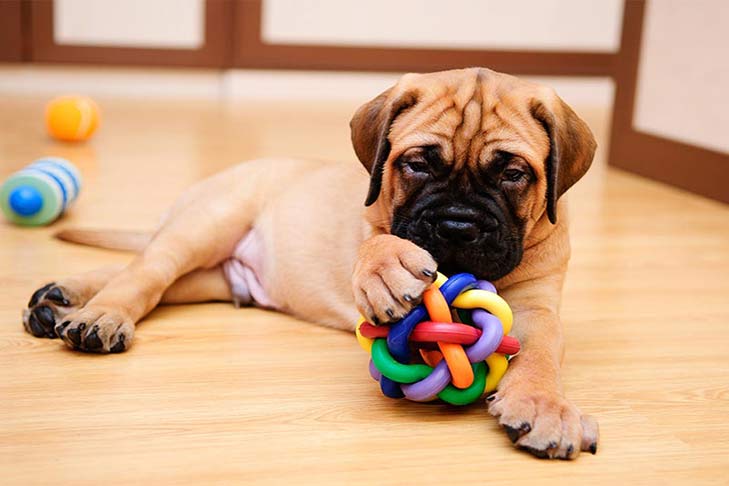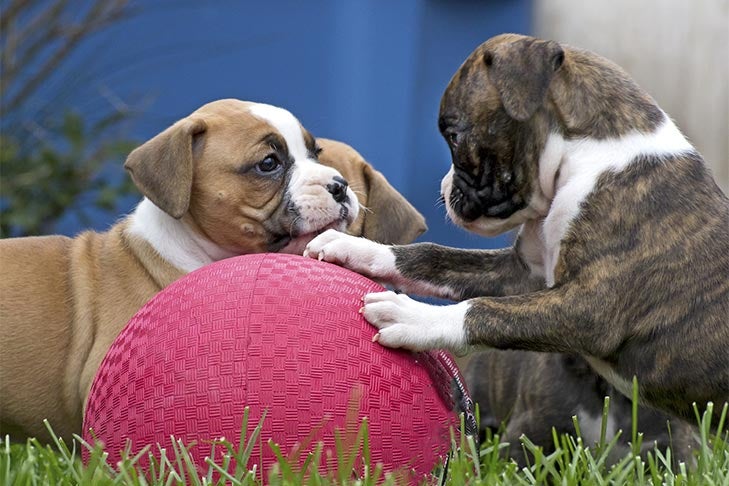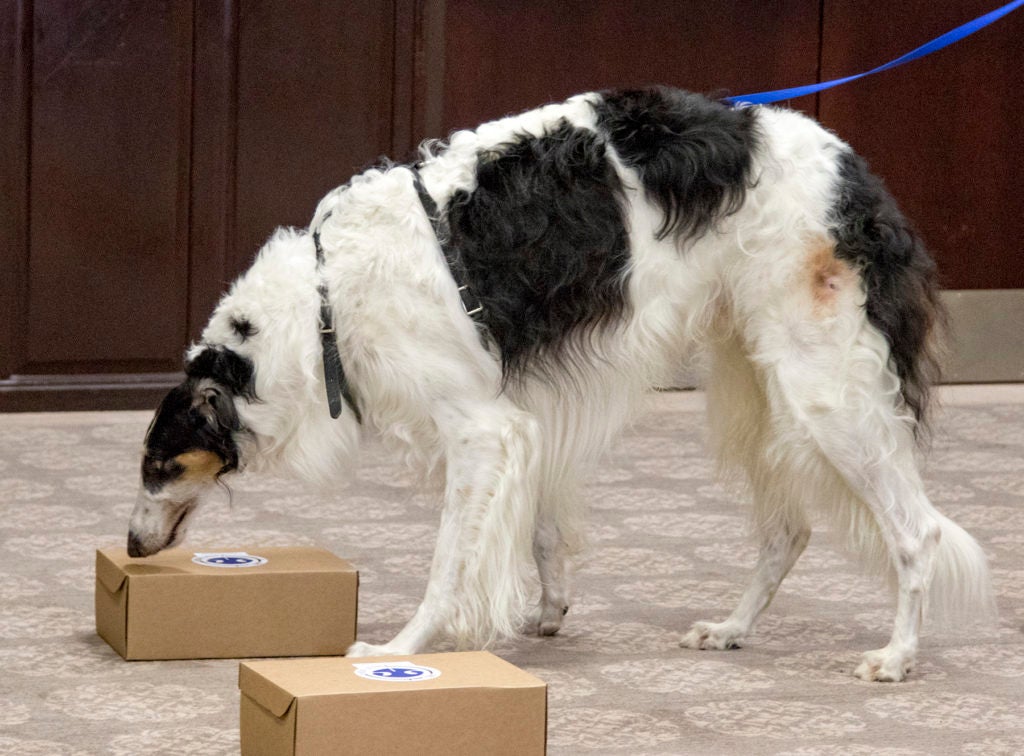Doggy Boredom – Signs and Symptoms
A bored dog will make his own fun. And most likely in ways that don’t work for you. When left to their own devices, bored dogs will chew furniture and shoes, shred pillows, or even unroll your toilet paper. Whatever they can find to pass the time. And because you’re not there to stop them, it’s all the more exciting.
Big messes when you get home are a clear sign of a dog with nothing to do. You might also see digging in the backyard or tipping over trash cans. And signs of boredom can be seen even when you’re at home. If your dog is always mugging you for attention and acting restless, chances are he’s bored and wants something to do. He might also jump on you and your guests or bark excessively.
Be sure to rule out separation anxiety if you’re seeing destructive behavior and a clingy attitude. Most of the time, this is simply your dog relieving his boredom and enjoying a lack of supervision. But occasionally it indicates intense distress about being left alone. If you have any concerns, consult a dog trainer or an animal behaviorist.
It’s true that a tired dog is more likely to nap than get into trouble while you’re out. So, make sure you’re giving your dog enough physical exercise. Talk to your breeder or veterinarian about how much exercise your dog needs. A Chihuahua might be good with a walk and a romp around the yard whereas the energetic Border Collie will need far more to satisfy his needs.
A ten-minute stroll around the block is unlikely to tire any dog, so make sure you’re adding in more vigorous exercise like chasing a ball or flying disc or giving him a safe place to run free. And keep your daily walks interesting. They should do more than provide a potty break. Take different routes and let your dog stop and smell the pee-mail.
Giving your dog’s brain a workout is as important as exercising his body. Plus, it’s equally exhausting. Before you head to work, try interactive games to challenge your dog’s mind. Activities like hide and seek, where your dog has to find you, or tug-of-war let you play together and build your bond. Scent games where you hide treats or toys around the house are also fun boredom busters.
It’s great to give your dog comfort and squeaky toys but add some puzzle toys to the toy box too. There are stuffed puzzle toys with hidden squeaky bits, lift the flap toys that hide treats, and balls and cubes your dog must roll around to get at the treats you’ve placed inside. Consider a snuffle mat as well. These have fabric flaps and loops that hide kibble or treats for your dog to sniff out. Whatever toys you give your dog, be sure to rotate them frequently so your dog stays interested. Even an old toy seems new and exciting when your dog hasn’t seen it for days.
You can also make your own puzzle toys from things around the house. Stuff peanut butter in a toilet paper roll and fold down the ends. (Just watch to be sure your dog isn’t eating the paper.) Roll treats up in a paper bag and let your dog tear it open. Put treats in a water bottle with the cap off so he must toss it around to get the food. Or hide a treat in one of the cups of a muffin tin then place tennis balls on top of each cup so your dog must remove the balls to find the food.

Training isn’t just for teaching good manners. It’s also a great way to provide your dog with mental stimulation. Obedience is a good start, but if you don’t want to compete, what do you do when you run out of behaviors to teach? How about trick training? There are endless behaviors you can teach just for fun, and you can match them to your dog’s interest and abilities. For example, a large breed might be taught to climb a ladder whereas a toy breed can learn to crawl under the coffee table. Check out AKC Trick Dog titles for something to work toward.
Sign up for a dog training class. There are so many types of classes that go beyond the basics. Consider rally, agility, or trick classes. The weekly meetings will not only hone your training skills, but you and your dog will get valuable socialization too. Look for an instructor who uses marker training such as a clicker. This style of positive reinforcement training focuses on teaching dogs how to learn and encourages their participation in the process. Clicker trained dogs offer new behaviors rather than waiting for instructions, and that’s incredibly stimulating and exciting for them.
Socialization isn’t just for puppies. Even adult dogs benefit from being exposed to new people and places. It’s mentally stimulating and a great way to combat doggy boredom. Be open on your walks for the chance to meet new neighbors and their canine companions. Or organize puppy play dates with other dogs. Just be sure the other dog is up to date on his vaccinations and a suitable play partner for your pup. For example, don’t match a rowdy dog who likes to roughhouse with a timid dog. Finally, check out the dog parks in your area. Your dog can run off-leash and make new friends. But always keep an eye on your dog. Just because he’s friendly, it doesn’t mean all the other visitors are.

Something as simple as making your dog work for his food can be incredibly fulfilling. Rather than simply putting a dish of kibble on the ground, consider putting that food in a slow feeder bowl. Meant for dogs who eat too fast, any dog can benefit from the challenge. Or put the kibble in a food-releasing puzzle toy. Mealtime will go from a two-minute gobble-fest to a half-hour game. Kibble hide-and-seek is another easy way to turn mealtime into entertainment. Simply sprinkle your dog’s meal around the house or backyard and let him sniff out each morsel.
Many dog breeds have a working heritage, from herding to guarding to pulling carts. Even those breeds developed to be companions enjoy keeping active and having a purpose. One of the best ways to prevent boredom is to fulfill your dog’s need to have a job. You don’t have to literally put him to work, as a therapy dog or search and rescue dog for example, but if you give him a hobby or a way to earn his rewards, you will meet his psychological needs.
Choose a hobby for your dog that suits his interests and heritage. For example, terriers were bred to go to ground after vermin. A digging box in the backyard would be a perfect gift for these guys. Use a kiddie pool or build a sandbox and fill it with dirt. Then bury special toys for your dog to find. If you continue to replenish the box, your dog will spend hours digging around for goodies.

Dog sports are another great way to give your dog a job. There are many options, so look for something you think your dog will enjoy. For example, AKC Scent Work is fun for all breeds but particularly exciting for scent hounds like Beagles. Or try treibball for herding breeds. In this sport, a dog must target and push fitness balls to you. And of course, agility is a great sport for any breed because it provides physical and mental exercise and builds the dog-human bond.
You can also do DIY versions of different dog sports at home. For example, drafting and carting are great for breeds like the Bernese Mountain Dog. These dogs were once used to pull carts, transporting items from farm to town. Pulling a home-made cart around the backyard or neighborhood gives these dogs a fun way to celebrate their heritage. Another option is a mini agility course in the living room or backyard made from things you already have around the house.
Sometimes, no matter what you do, you must leave your dog alone for longer than he would like. Along with providing challenging toys, edible chews, and a stuffed Kong, you can also hire outside help. A dog walker can take your dog out in the middle of the day for exercise and fresh air. Or you can hire a pet sitter to make a drop-in visit while you’re out. A sitter can play with your dog, keep him company, and even refill his Kong. Finally, to provide your dog with all-day company, consider doggy daycare. He can enjoy supervised play with other dogs for hours and will come home exhausted and content.
The AKC is here to help owners with questions and concerns about COVID-19 and dogs. Find answers to your questions, plus at-home activity ideas, training tips, educational resources, and more on our Coping With COVID-19 hub. https://www.akc.org/wp-admin/admin-ajax.php Get Your Free AKC eBook
Clubs Offering:
Originally, different dog breeds were bred to have different jobs. Even companion breeds were meant to spend all day with their humans. But these days, most dogs get everything they want for free with no work involved. Plus, they spend hours alone while we go off to work or to run errands. So, do dogs get bored? Absolutely! Doggy boredom can lead to problem behaviors, but more importantly an unhappy dog. Read on to learn the signs of boredom and tons of tips for making sure your dog is getting all the stimulation he needs.